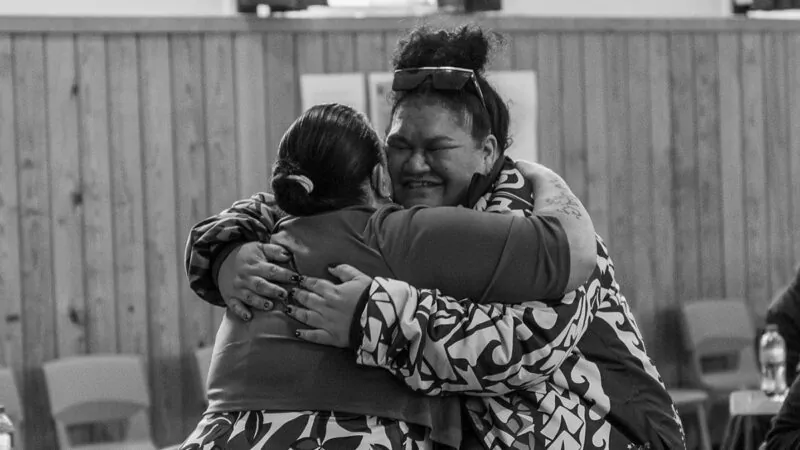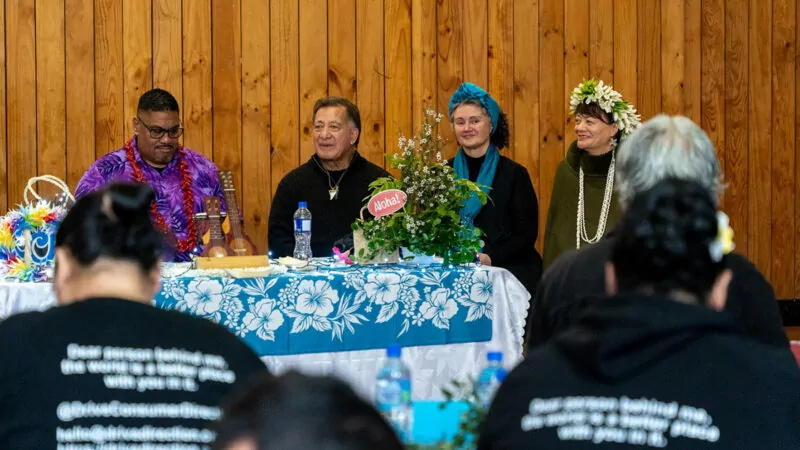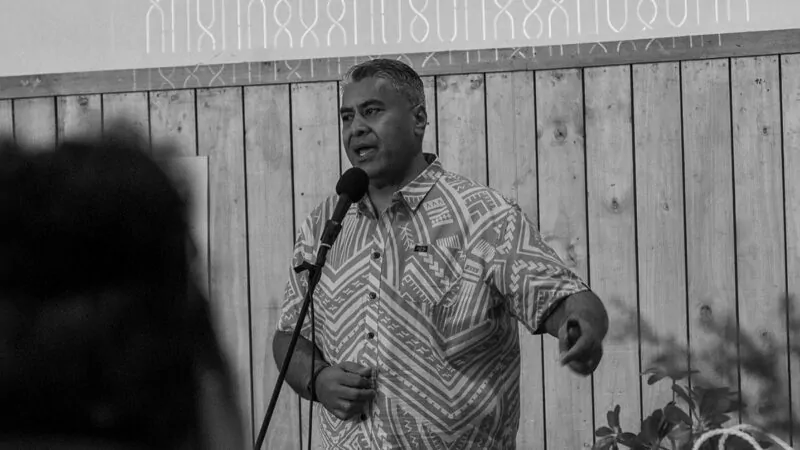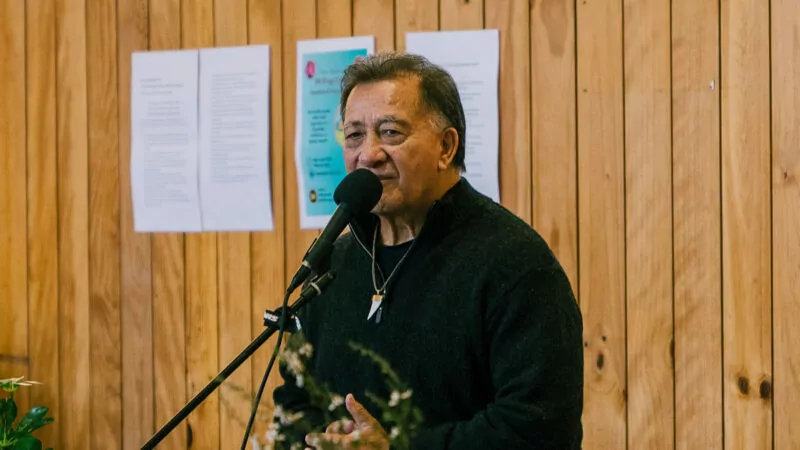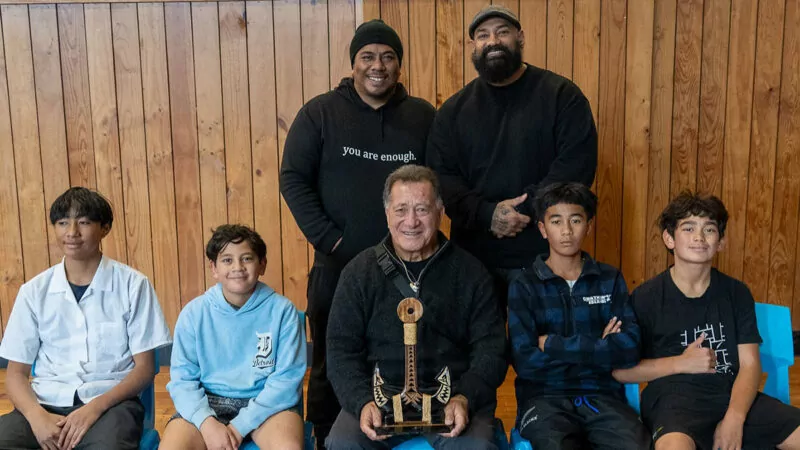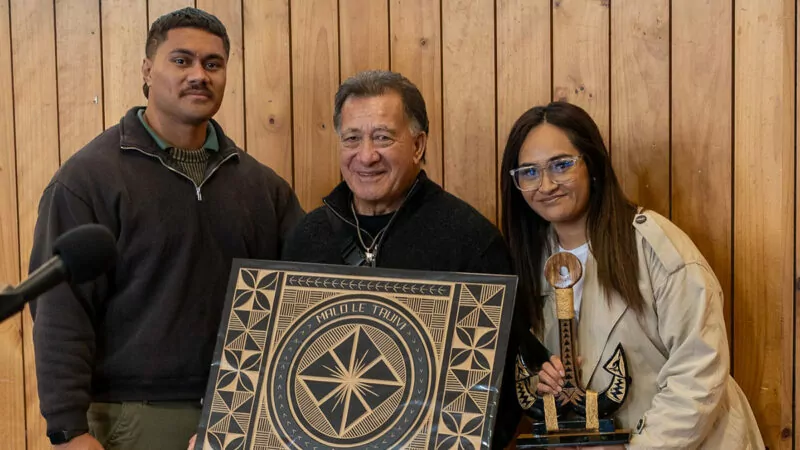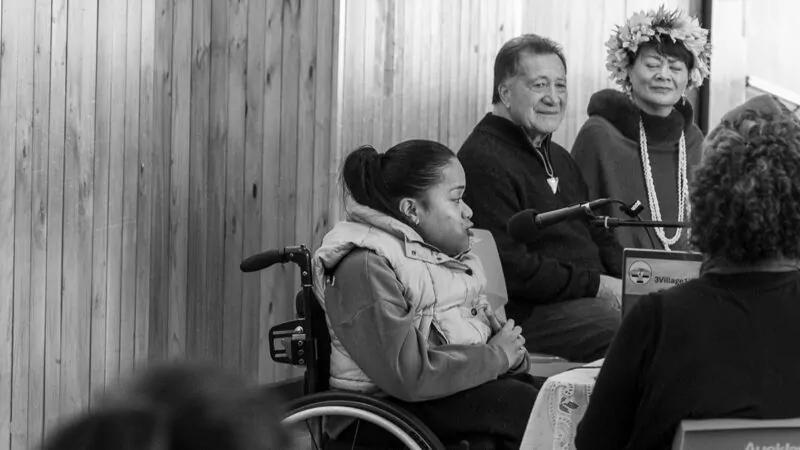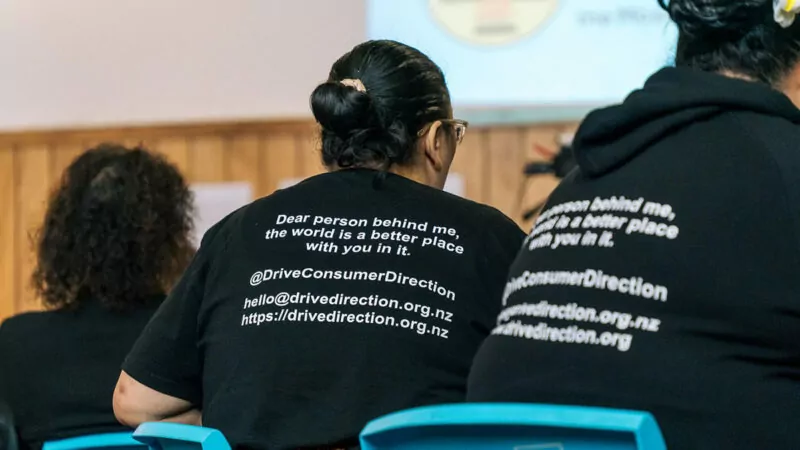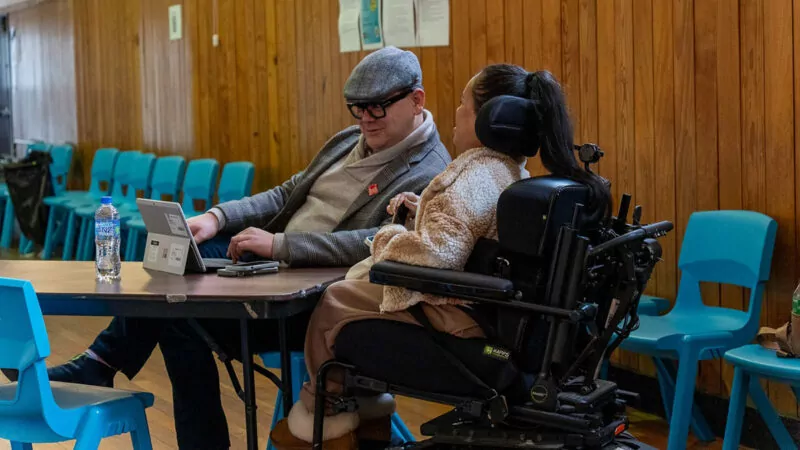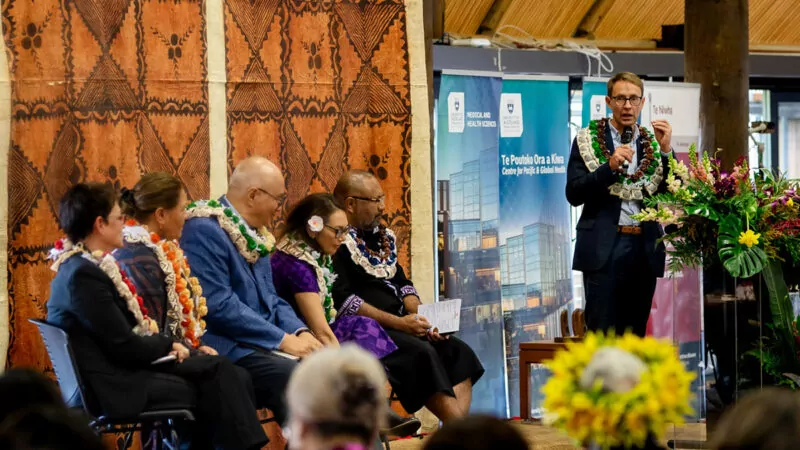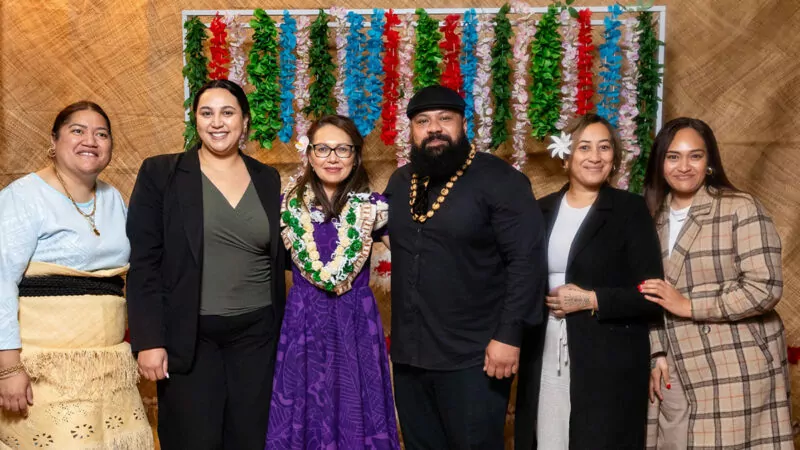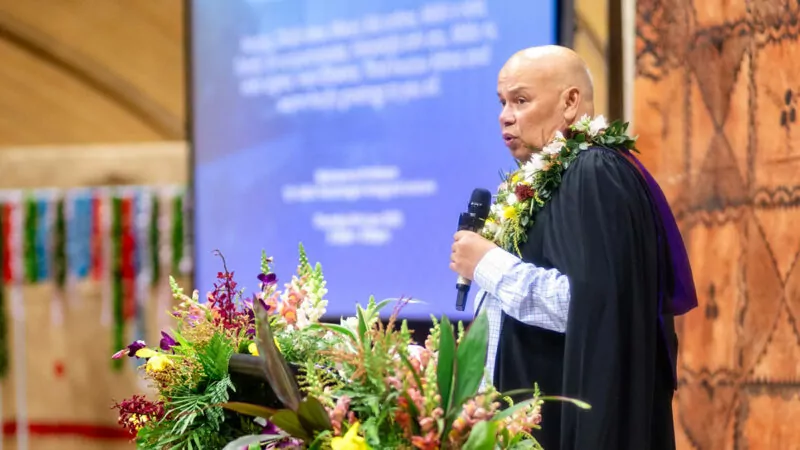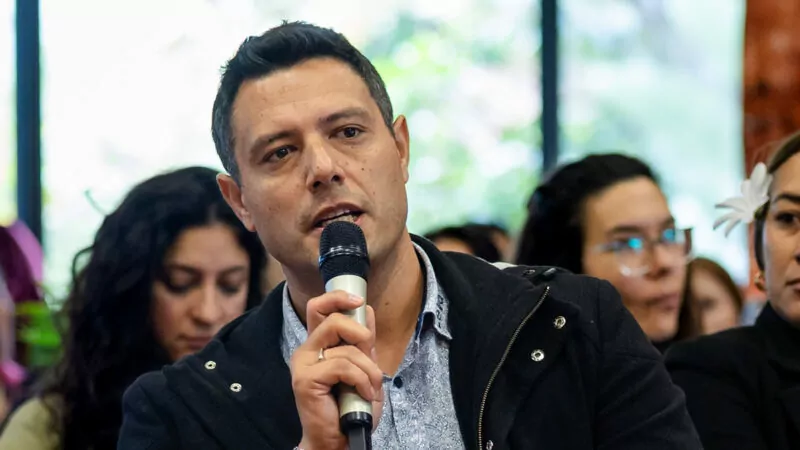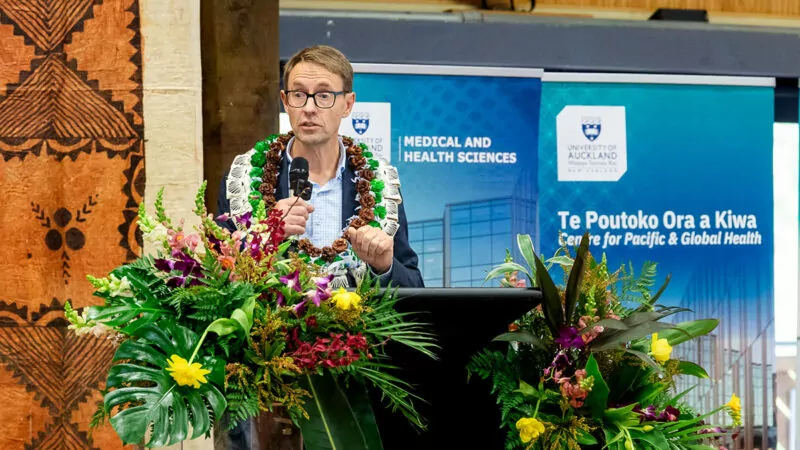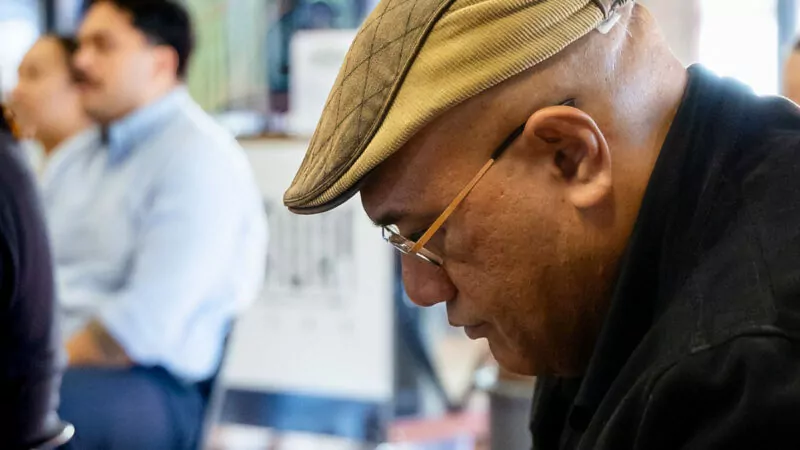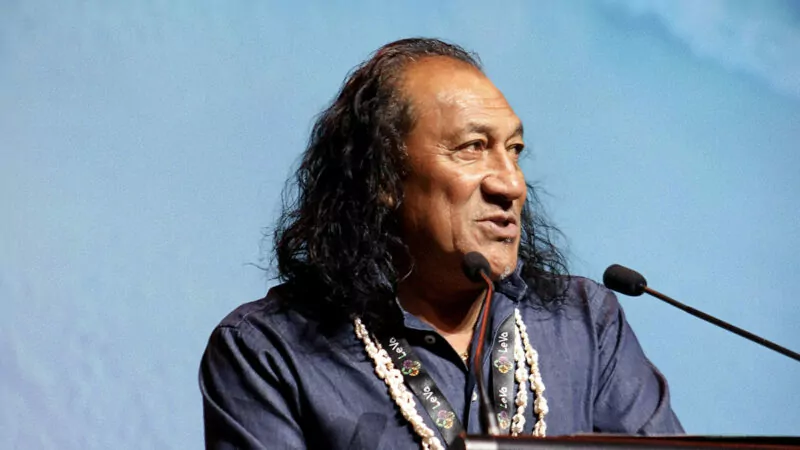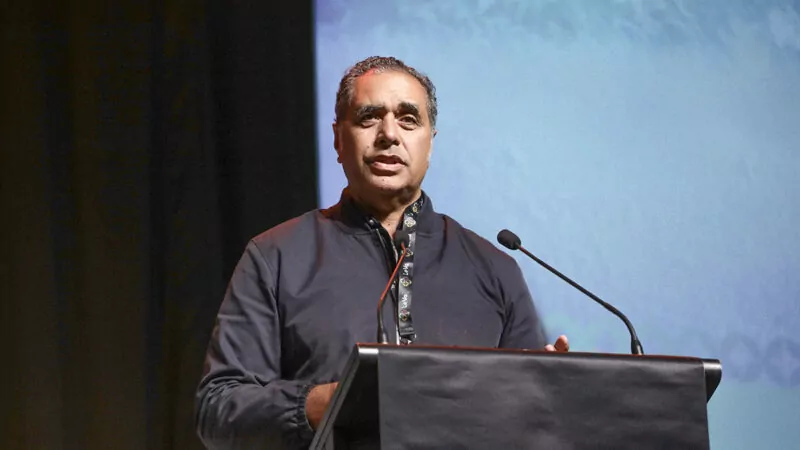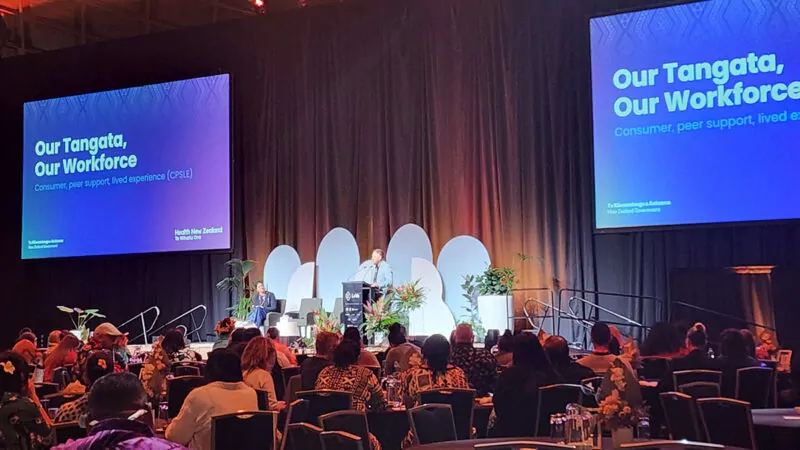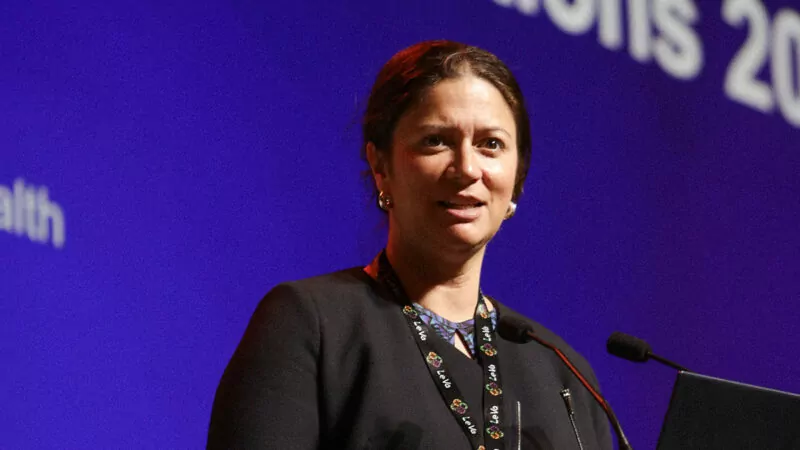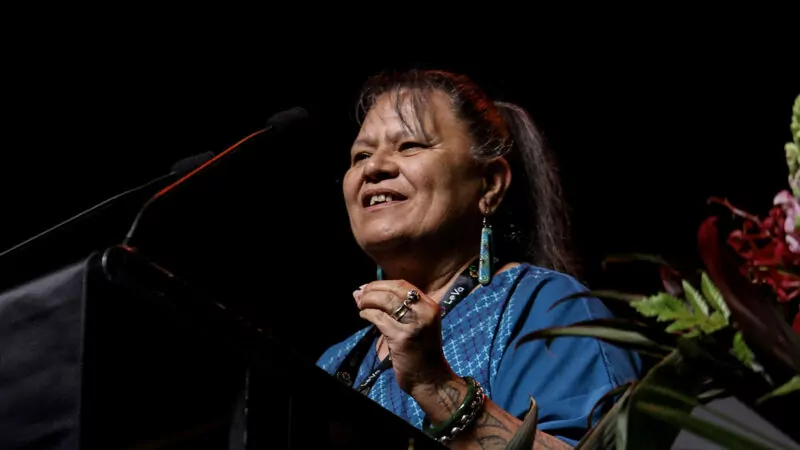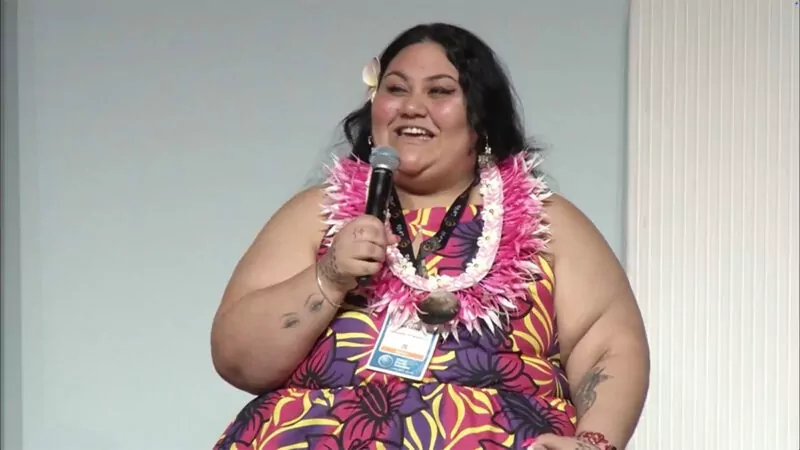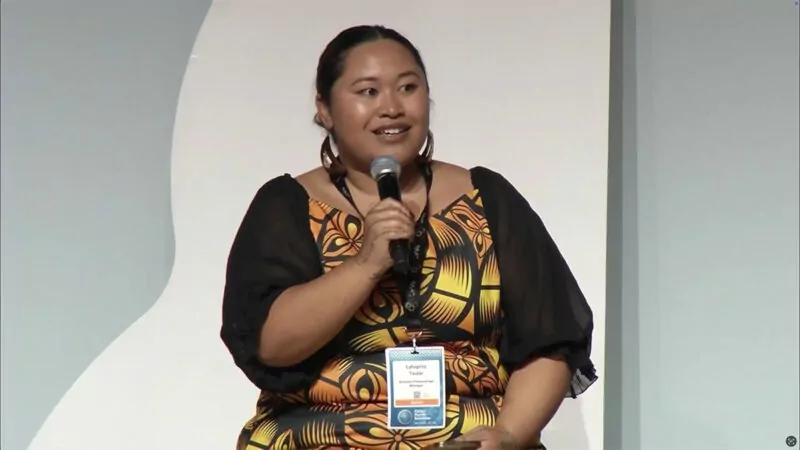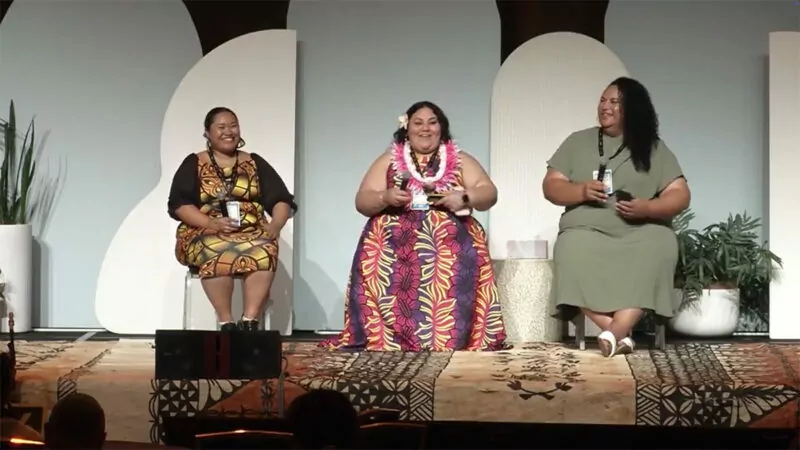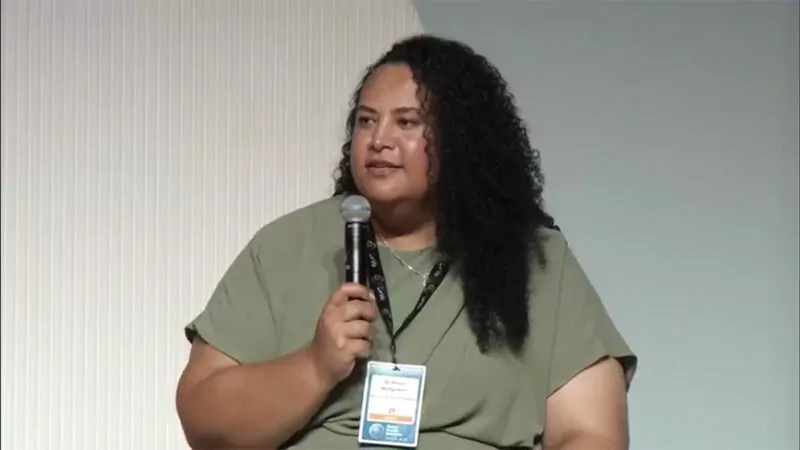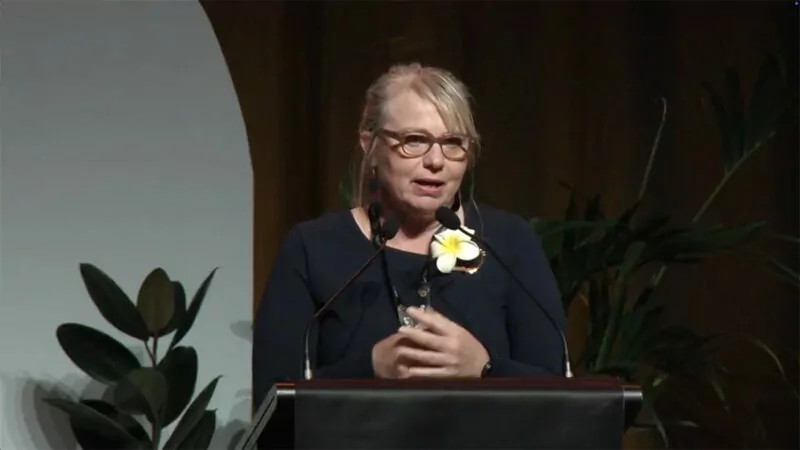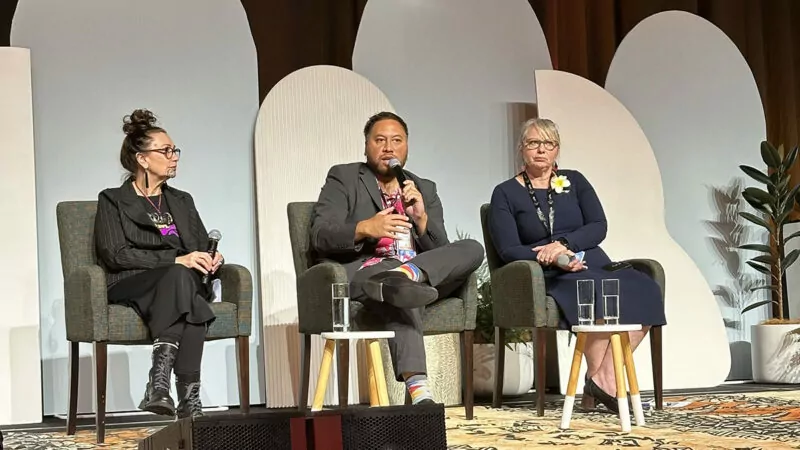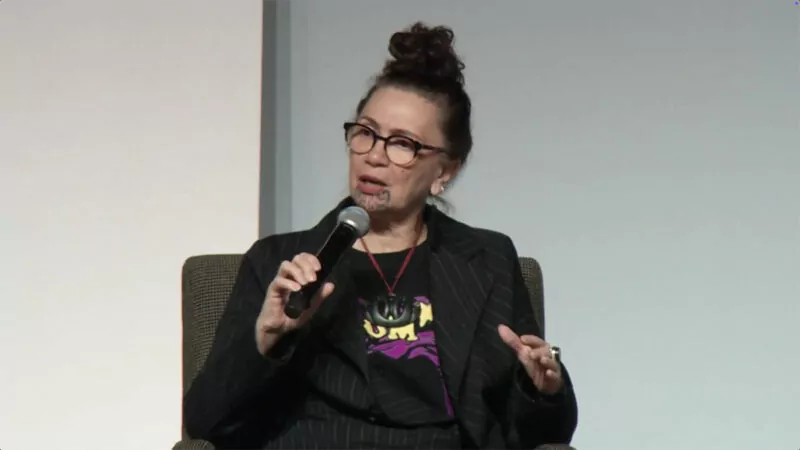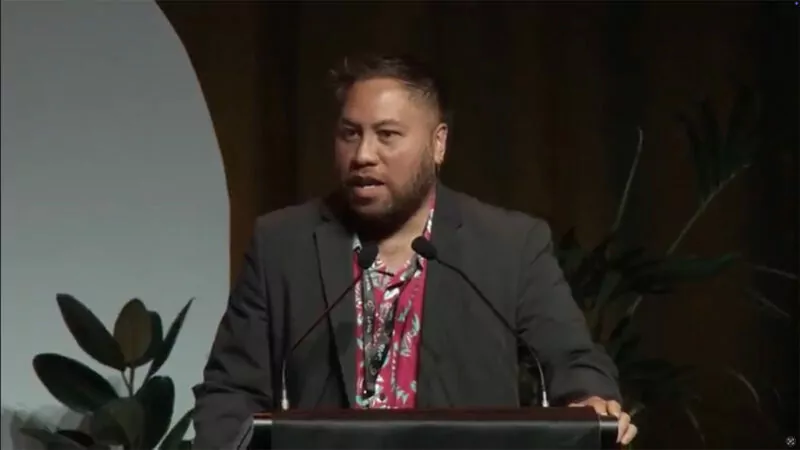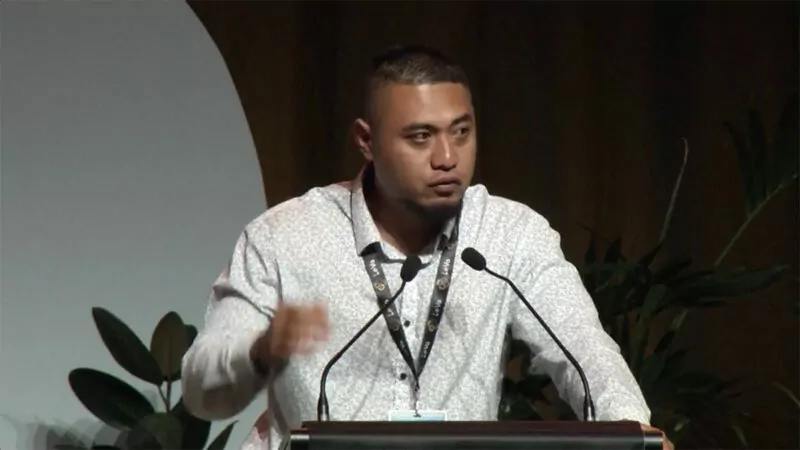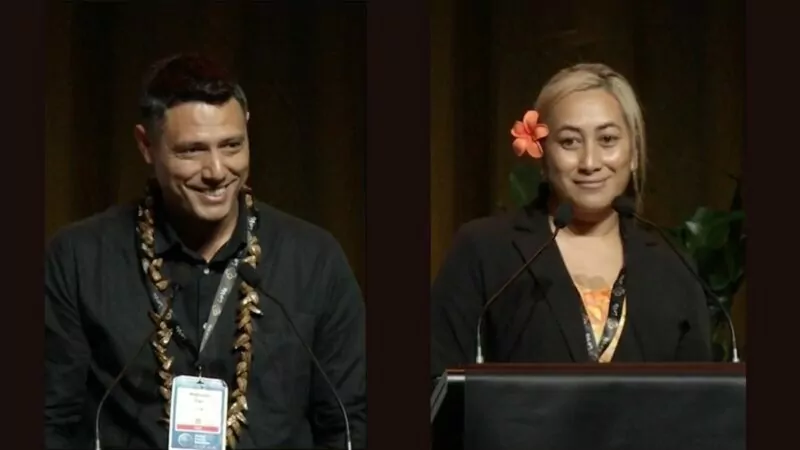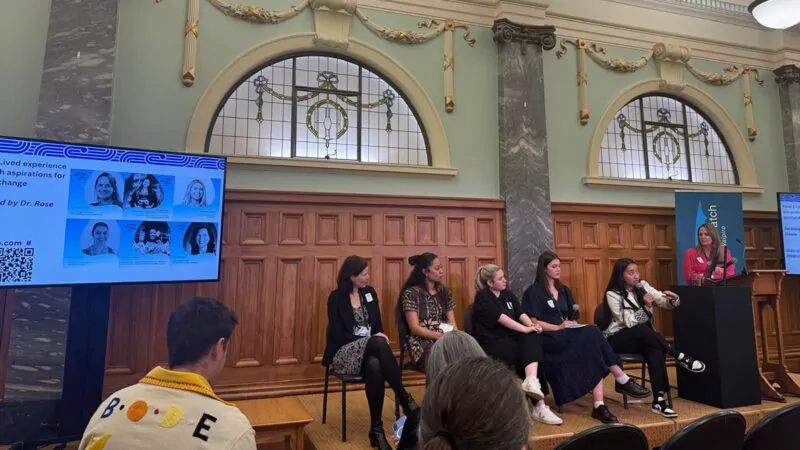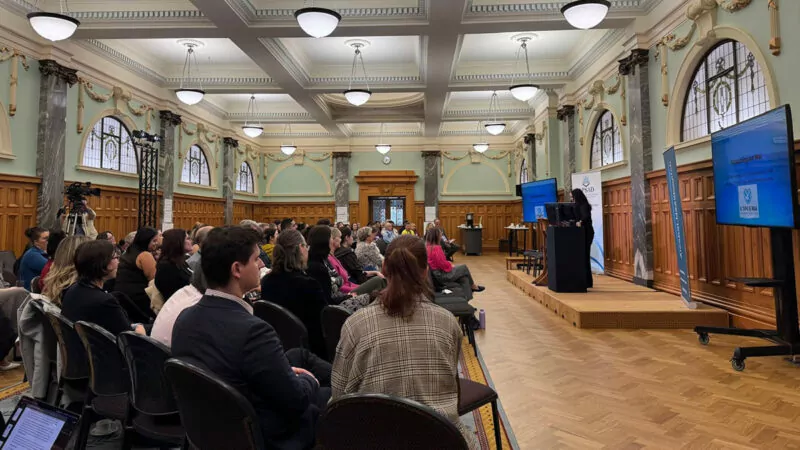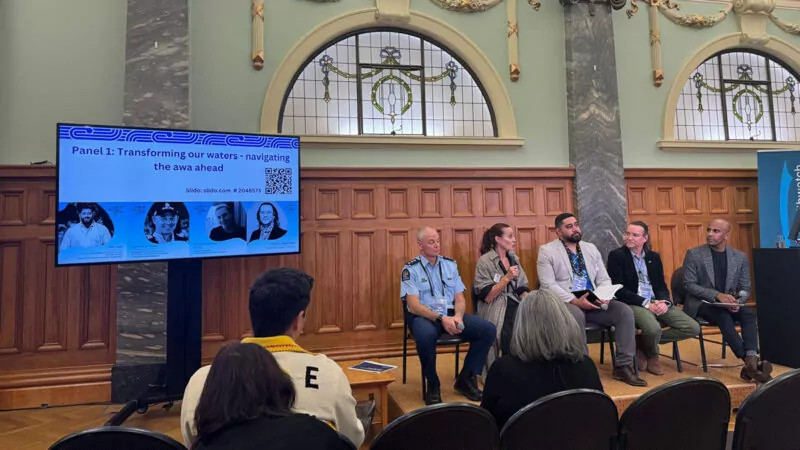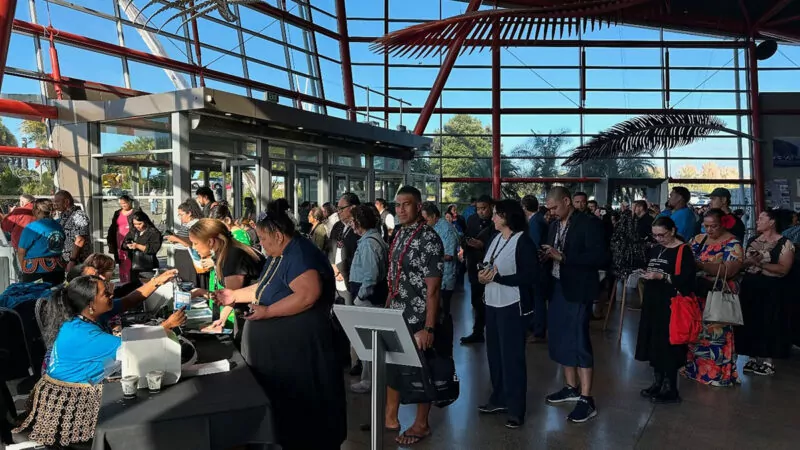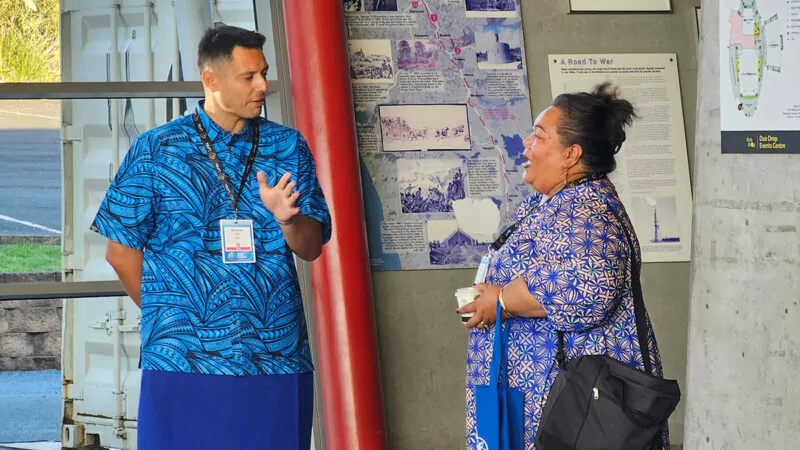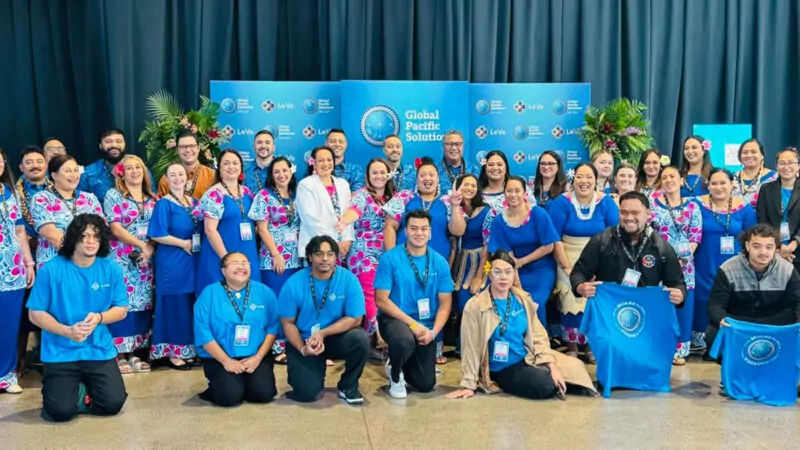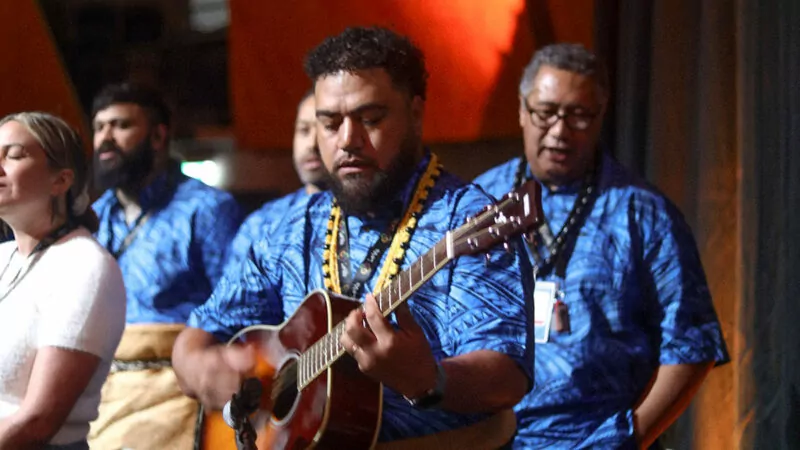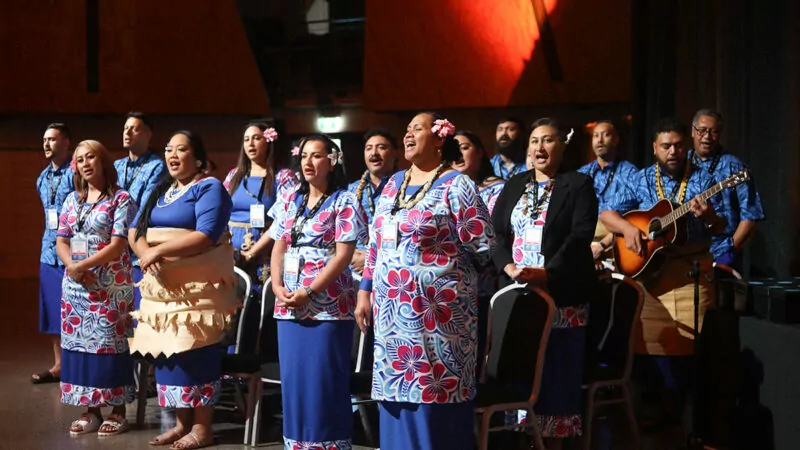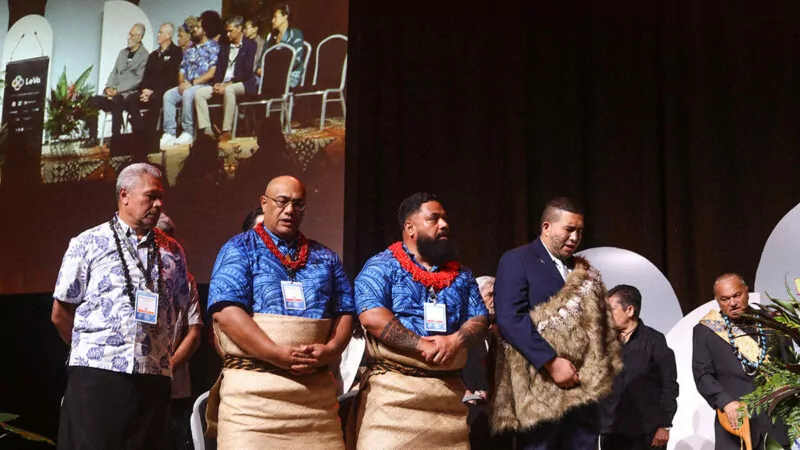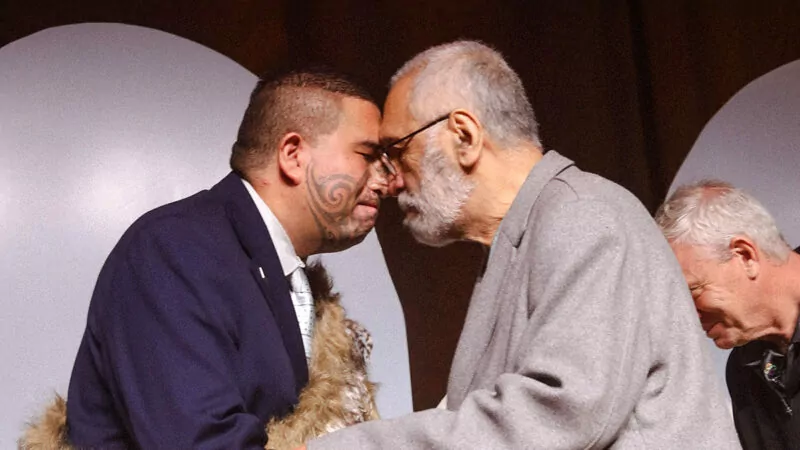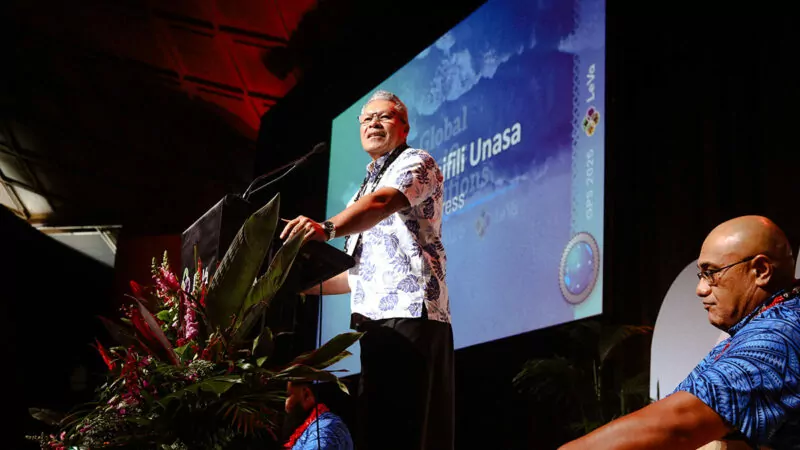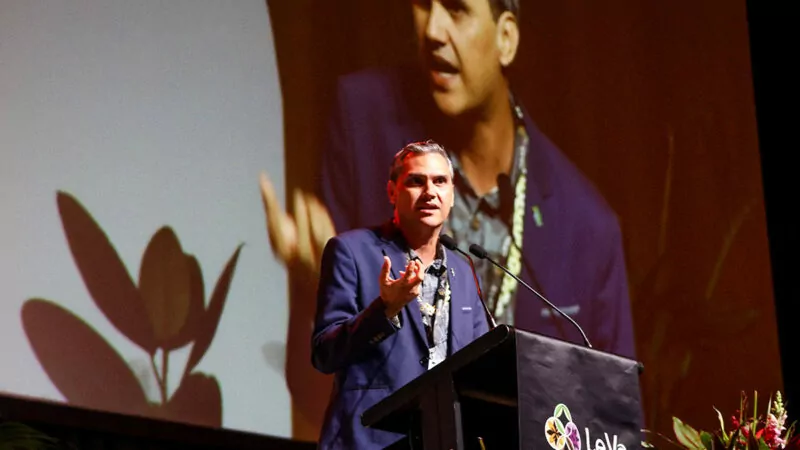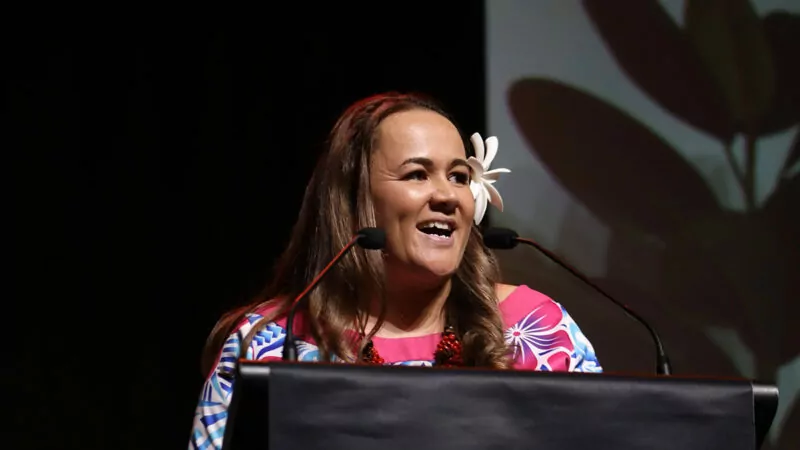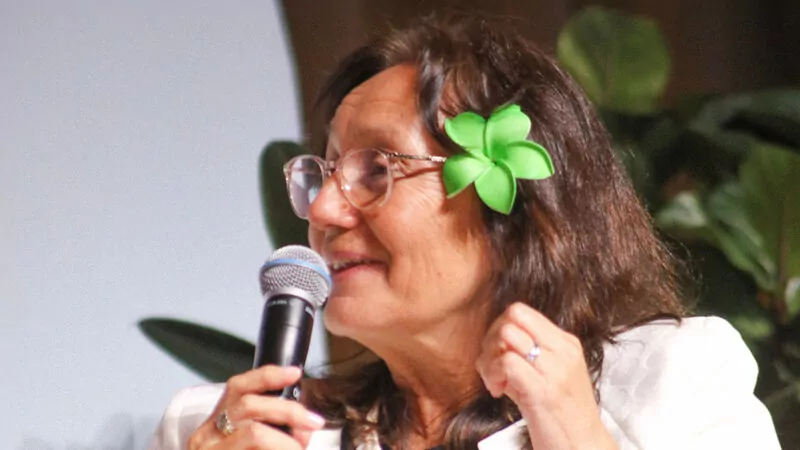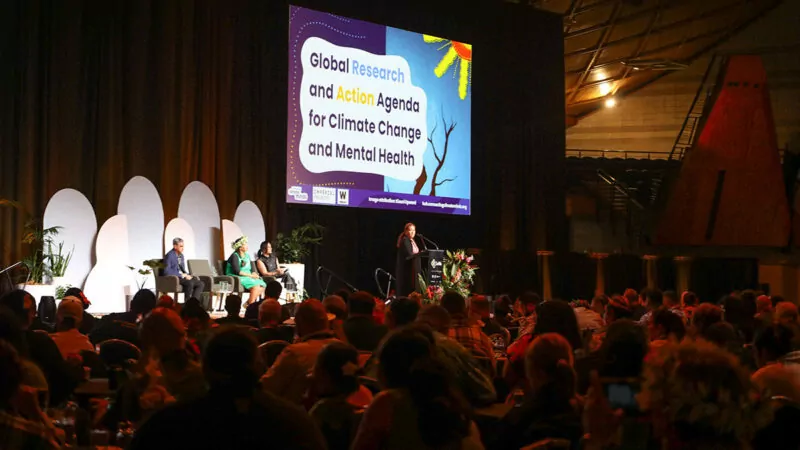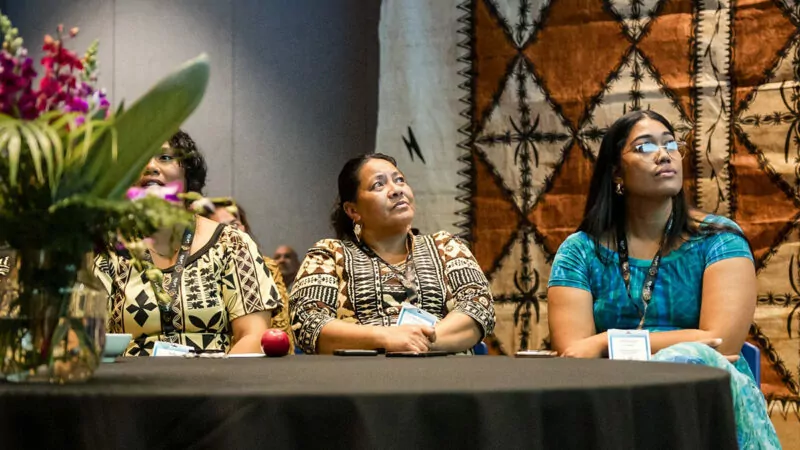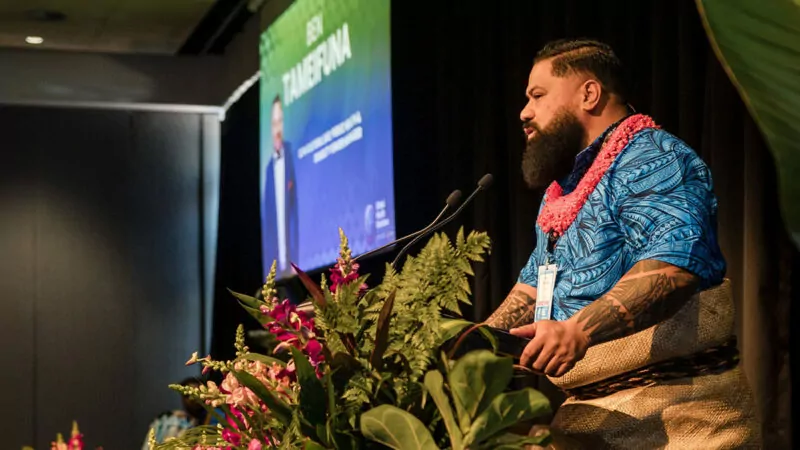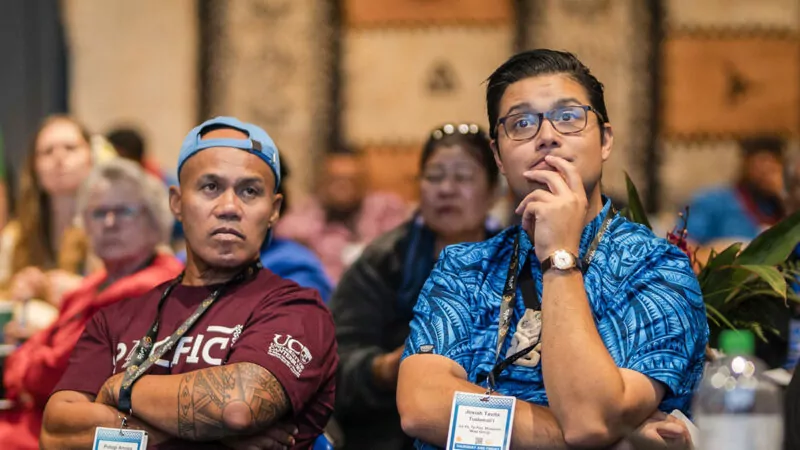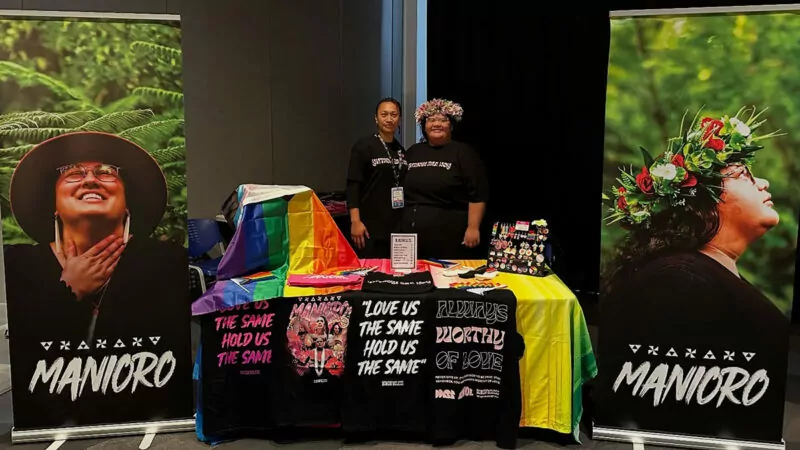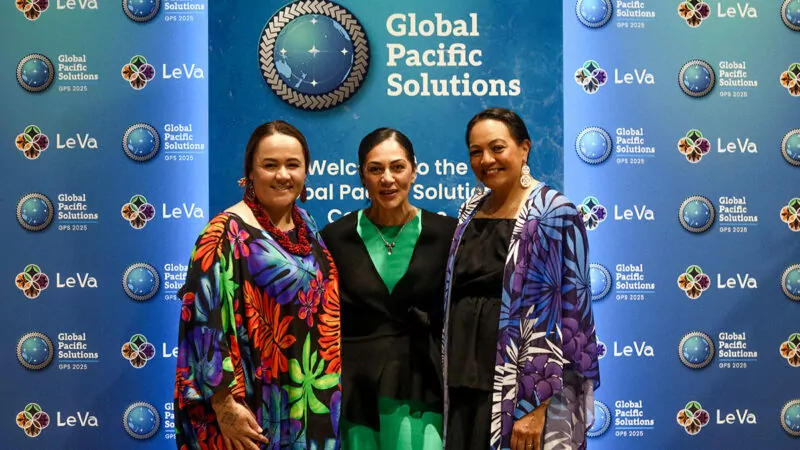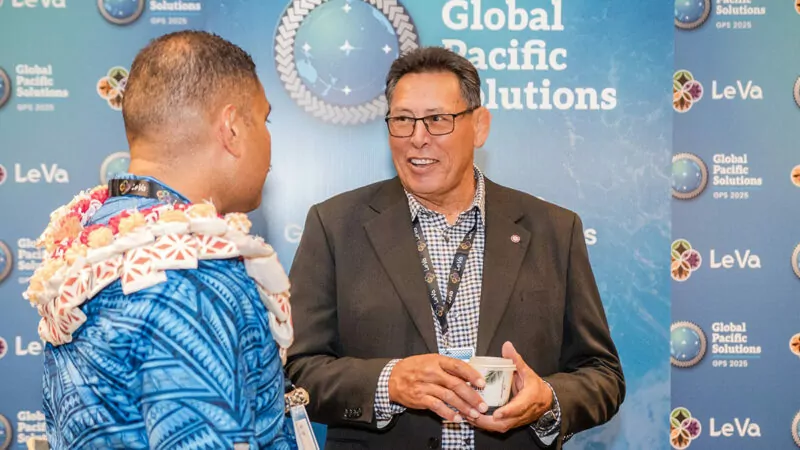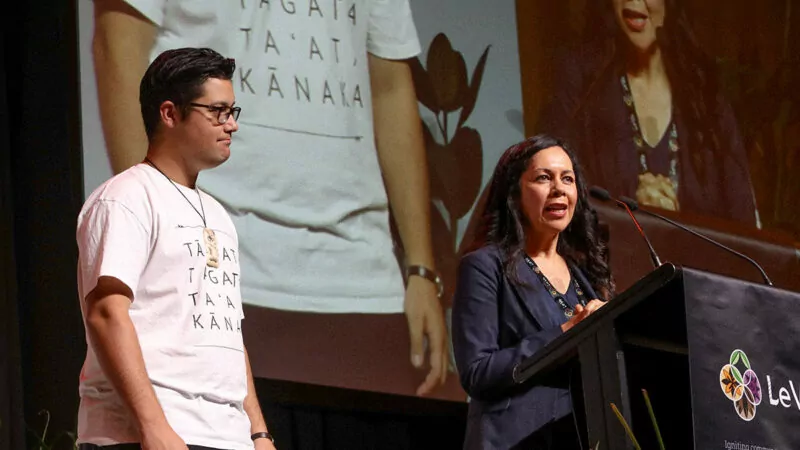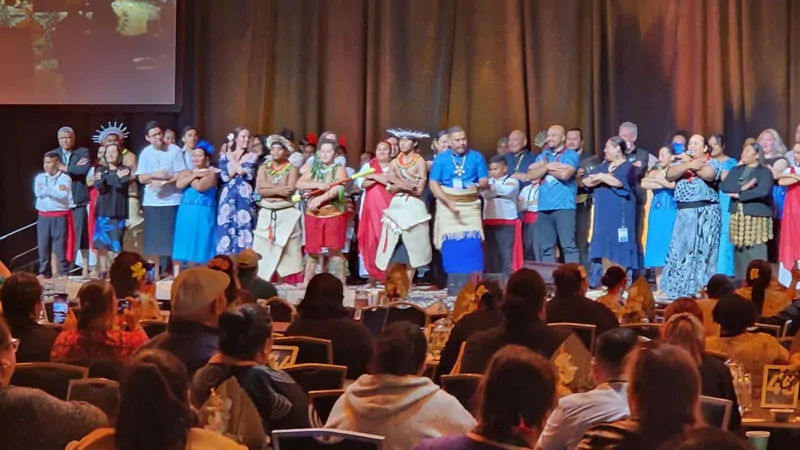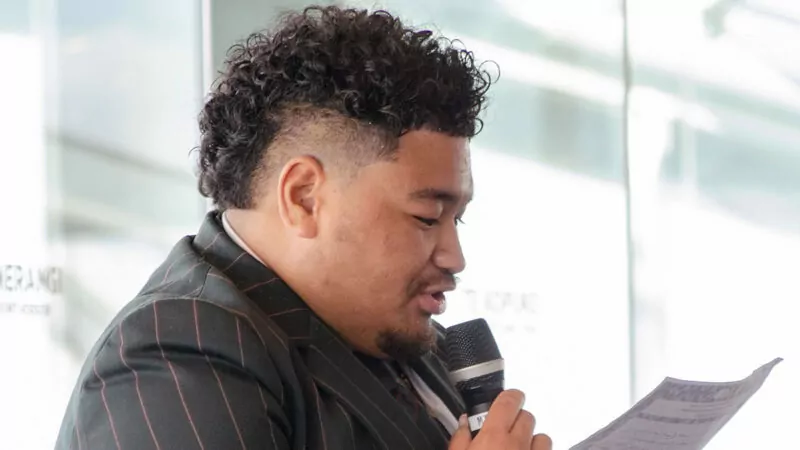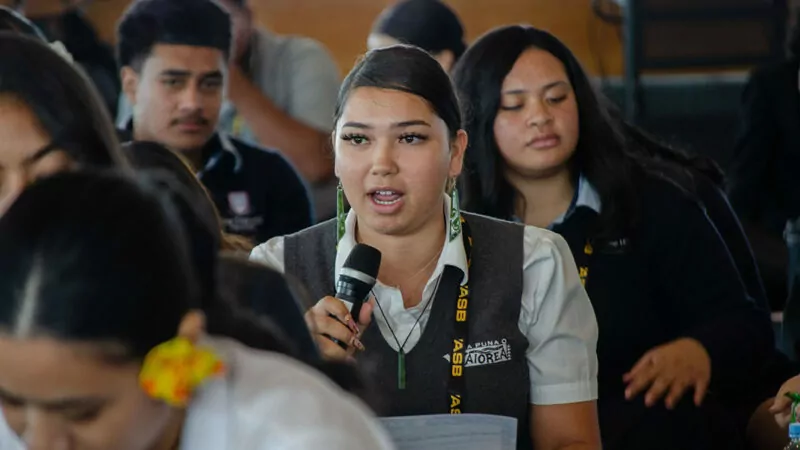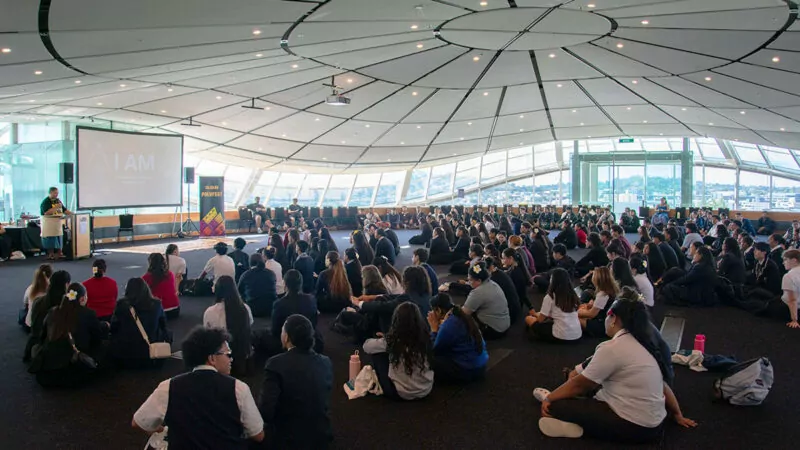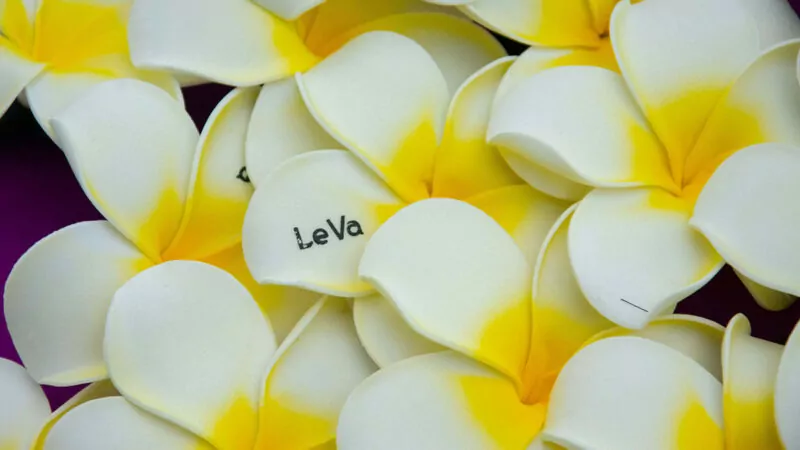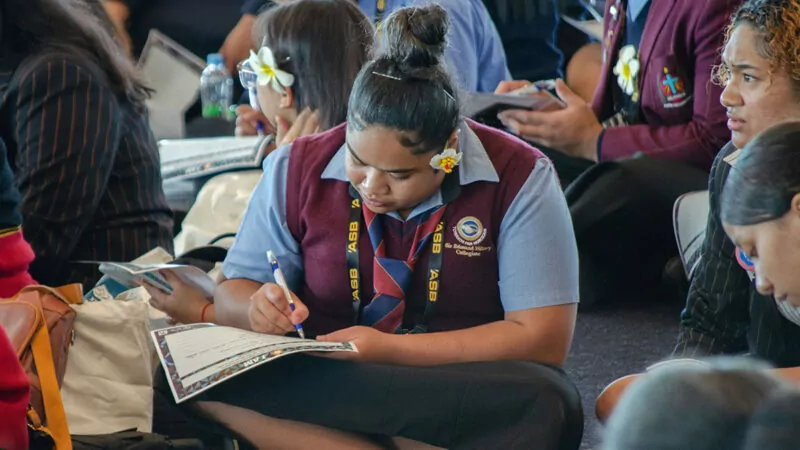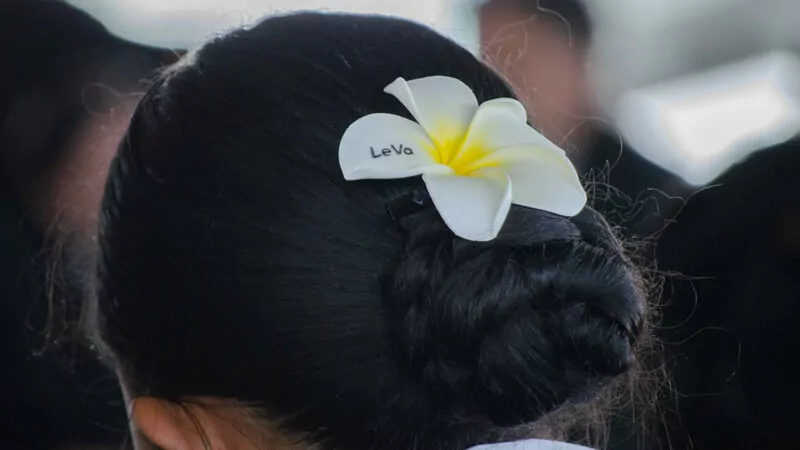On the last day of June, Pacific people with lived experience of disability, addiction or mental health challenges, and the workforce who support them, gathered in Papatoetoe for the ‘Tiare Ruperupe 2025: Combined Regional Fono’.
Hosted by 3village1island, attendees came from across Aotearoa – from Ōtautahi, Pōneke and Napier – to connect, share and help shape a positive future for our families and communities.
Members of Le Va’s mental health and addiction team welcomed the opportunity to join the fono, which united practitioners and lived experience leaders across the mental health, addiction and disability sectors.
Jasmine Leota, senior project coordinator at Le Va, said, “The fono created a valuable platform for talanoa, connection and shared insight.
“We were honoured to hear from Dr Junior Ulu, Director of Pacific Health at the Ministry of Health – his contribution added significant depth to the day’s discussions.”
Our team also had the opportunity to acknowledge and celebrate the remarkable achievements of Papali’i Seiuli Johnny Siaosi (KSM), a respected leader and pioneer in the sector, recently awarded the King’s Service Medal in the 2025 King’s Birthday Honours.
Nearly everyone at the fono had lived experience of disability, addiction or mental health challenges or had personal lived experience of supporting fanau.
The shared goal at the fono was to strengthen the Pasifika workforce through collaboration, and contribute to building a robust Pacific mental health and addiction workforce at an event that helped infuse hope, knowledge and support.
“As climate change continues to reshape our world, Pacific communities face unique challenges that demand innovative health solutions.” – Te Poutoko Ora a Kiwa.
In June, members of Le Va’s Public Health and Mental Health & Addiction teams were privileged to attend the Te Poutoko Ora a Kiwa (Centre for Pacific and Global Health) Research Symposium – ‘From Vulnerability to Vitality: Global and Pacific Health responses in a changing climate’ at the University of Auckland’s Fale Pasifika.
The day brought together distinguished health leaders, Pacific researchers, health professionals and changemakers committed to advancing wellbeing and equity through Pacific-led knowledge, solutions and innovation.
Le Va’s Pasifika Equity Lead, Pakilau Manase Lua, gave a presentation on “Making Our Moana Healthy Again” as part of the Pacific Leadership stream, and the team was honoured to attend Professor Sir Collin Tukuitonga’s inaugural professorial lecture, celebrating his service and leadership in Pacific and global health.
It was an inspiring day and wonderful for our team to reconnect with many of the presenters from Le Va’s recent Global Pacific Solutions 2025 conference, continuing the vital conversations around climate, culture and community.
Te Poutoko Ora a Kiwa was established in April 2023 as the first University research centre dedicated to Pacific and global health solutions and leadership. With Prof. Sir Collin Tukuitonga at the helm, its mission is to transform and impact health for Pacific people in Aotearoa, in the Pacific region and globally.
For more than 16 years, Le Va’s purpose has been to support people of the moana to unleash their full potential. We do this by carefully designing and developing evidence-based resources, tools and support services for the best possible health and wellbeing outcomes.
Together, we move from vulnerability to vitality, driving action for thriving Pacific communities.
It’s essential that Pasifika are involved from the outset of any study about our experiences.
With a new Child and Youth Mental Health and Addiction Prevalence survey on the horizon for Aotearoa, Le Va has put together guidelines to ensure the experiences of Pasifika peoples are accurately and respectfully captured, alongside other priority groups.
In Aotearoa, there is a longstanding data deficit around youth mental health and addiction, which means a prevalence study of this kind is long overdue. We know our Pacific young people experience higher rates of mental health distress and barriers to accessing culturally appropriate mental health care.
Addressing existing gaps in understanding by collecting and analysing comprehensive and up-to-date data is vital to informing policy development and driving improved wellbeing outcomes for all families and communities in Aotearoa.
Le Va welcomes the government’s commitment to ongoing funding for measuring mental health and addiction challenges among children and young people to help determine what supports are needed. We also know it is important to further our understanding of the causes of mental health challenges to prevent them from occurring in the first place.
Le Va’s general manager, Mati Dr Elizabeth Mati, says, “It’s essential that Pasifika are involved from the outset of any study about our experiences. From study design and measurement tools to interpreting findings, cultural, clinical and lived Pasifika expertise must be included to ensure accuracy and cultural integrity.”
Le Va’s report calls on the New Zealand Government to ensure the inclusion of Pasifika peoples in this important national prevalence study is done in a culturally relevant and meaningful way.
Many thanks to those who contributed to our comprehensive report: Moana Connect, PwC New Zealand, Le Va’s clinical governance group and Pasifikology. Together we share the goal of enhanced outcomes for Pasifika communities, with early intervention, evidence-informed decision making and equitable resource allocation.
Tu Tonu – standing strong in our purpose. A reflection from the Tu Tonu mental health and addiction stream at Le Va’s Global Pacific Solutions 2025 conference.
It was incredible to see so many of our Futures that Work scholarship recipients at the Global Pacific Solutions 2025 conference. We hope the wisdom shared by our 60 speakers inspired you, and that connecting with more than 700 passionate delegates reminded you just how valued and essential you are in the Mental Health and Addiction workforce.
Right now, our communities need aroha, manaaki, tautua and leadership to help transform lives. The future is yours to shape – and we’re with you every step of the way.
Day One
Day One of the Tu Tonu Stream started with the Pasifika mental health and addiction workforce at the centre of discussions celebrating the strengths of Pasifika people while identifying the tensions and challenges they face.
Distinguished leaders from across the Mental Health and Addiction sector included Makerita Poutasi, Aaryn Niuapu, Terri Cassidy and Dr Siale Foliaki led the facilitation of the inaugural session.
They shared their insights around the importance of cultural knowledge, strong relationships, and collective values in shaping Pasifika approaches to wellbeing. Many spoke about the pride that they held in serving their communities, in contrast to the friction that existed in carrying the emotional labour of cultural expectations in systems that do not always value or understand Pacific worldviews.
The audience was invited to reflect on the systems and models of care that often shape our practice unconsciously, and to question how well models of care and systems serve our most vulnerable Pasifika communities. They were challenged to dream boldly: What could care look like if investment were directed toward models grounded in kinship?
Pasifika scholars and leaders who are champions in the Pasifika youth space – Dr Penni Wolfgramm, Dr MahMah Timoteo Tohoa Tetini and Latayvia Tautai – articulated a bold vision for reimagining models of care that are culturally grounded and responsive to the needs of future generations.
They highlighted storytelling and resilience as vital tools for navigating an uncertain world and called for a shift from deficit-based thinking to strength-based leadership. Key to this transformation were creativity, digital fluency, and the powerful sense of interconnectedness among Pacific youth.
Day Two
Day Two of the Tu Tonu stream opened with a panel of public health representatives, lived experience leaders and cultural advocates – Dr Sarah Helm, Tracey Potiki and Aaryn Niuapu.
They spoke about addiction as a response to disconnection, intergenerational trauma and structural disadvantage. Shame continues to be a barrier, both personal and collective, preventing people from seeking help or potential supports.
The panel called for an expanded view of recovery, that was fit for purpose that included housing, cultural connection and whānau engagement. Discussions illustrated how services are often reactive and rarely preventative or healing. This brought to light the urgent need for Pasifika-led solutions, which were framed as essential rather than optional.
The closing session of the Tu Tonu stream focused on the foundations of Pasifika healing, ancestral knowledge and practices, with presentations from Musuiaiga Neil Tapu Sitagata, and Le Va’s very own Seiuli Angel Timali Tiatia-Siau and Nicholas Cao.
Musu highlighted that many of the tools necessary for wellbeing and connection are already embedded within Indigenous knowledge systems.
Musu posed the questions: “Right now, ask yourself, is there space in my heart for these practices? What would it take to make them visible again in our homes, workplaces, and systems of care?”
The session provided experiential practice of self-compassion with a resounding question “Can I be vulnerable and allow myself a break”? This is talanoa fogāfala – a form of Pasifika relational healing that is grounded in the va, the space that honours relationships and connection.
Angel and Nicholas emphasised the integral role of cultural identity, relationships, and collective connection in strengthening resilience and mental wellbeing. They highlighted how mental health challenges must be understood within the context of Pasifika values, which provide a vital framework through which Pasifika workers can reconnect with their heritage and find strength amid the pressures of frontline work.
The session also incorporated a culturally adapted self-compassion meditation rooted in Pasifika notions of balance, navigation and ancestral guidance. Participants were encouraged to Tu Tonu, to stand strong and to stay grounded in their identity and values, reinforcing that self-kindness and mindfulness are critical components of sustainable wellbeing in mental health and addiction roles.
The call to action to minimise the impact of alcohol in our communities is longstanding – especially for our Māori and Pasifika whānau, people living with disabilities or fetal alcohol spectrum disorder (FASD), and people living in our most deprived communities in Aotearoa.
For many this is a generational problem with wide, deep and intertwining roots. Many of us have our own stories and stories of whānau whose lives, families and communities have been impacted in some way by alcohol related harm.
Fa’afetai tele lava to the Minister for Mental Health, Hon Matt Doocey, to the Alcohol Healthwatch Committee and partners for bringing together all strands of the community – kaumātua, lived experience whānau, researchers and workforce – to talanoa at the Alcohol and Mental Health Symposium held at Parliament in May.
It was uplifting to hear from future leaders who shared their wealth of experience especially from a lived experience perspective and to feel the breadth of support and advocacy for stricter policies around alcohol sales.
Learning about initiatives like Influence Engine in Australia – a publicly available conflict of interest online tool that sheds light on relationships between politicians and the alcohol industry – and hearing of local initiatives that are holistic, culturally grounded and prevention focused such as E Tipu E Rea Whānau Services in Tāmaki Makaurau – was invaluable.
The symposium’s theme was ‘Mā te wai, ka ora: Transforming our waters, transforming ourselves’. Transforming our waters requires community-wide self-reflection that starts with ourselves.
What messages do we support in our communities when it comes to alcohol? Do our individual/whānau/community actions consistently align with our desire for safe communities free from alcohol harm?
Asking ourselves these challenging questions will help us discover the path to true transformative change.
Over two impactful days in April, around 700 people joined together at the Due Drop Events Centre in Manukau for Le Va’s Global Pacific Solutions 2025 conference – uniting Pacific leaders, academics, international guest speakers, workforce and community members in a tour de force of strengths-based solution seeking.
Bringing to light tough topics such as child trafficking, suicide prevention, climate change, child sexual abuse, equity for disabled people and the ever-growing demand for mental health and addiction support workers, GPS 2025 was an event that opened minds, challenged the status quo and inspired hope for all who attended.
At times, the audience was moved to tears upon hearing transformative stories of overcoming adversity, fighting for justice and connecting to culture in a way that enhances our true selves.
Inspirational plenary speakers and breakout presenters communicated passionately, sharing their expertise to advance the knowledge of all who listened.
When opening the ‘Nurturing our Children’ plenary panel at GPS 2025, Le Va’s chief executive, Denise Kingi-‘Ulu’ave, said, “It is both an honour and a solemn responsibility to welcome you to today’s panel discussion on child sexual abuse and child trafficking across the wider Pacific.
“This is a conversation that demands our full attention, our collective expertise and most importantly, our unwavering commitment to action.
“The Pacific is home to diverse and resilient communities, but it is not immune to the global crises of child sexual exploitation and trafficking.”
We know that the solutions lie within our communities – GPS 2025 was an opportunity to bring together into one space the hearts, spirits and minds of hundreds of people, all eager to ignite change and promote the power of Indigenous intelligence.
Over the coming weeks, Le Va will be sharing many of the insights and solutions that were explored throughout Global Pacific Solutions 2025, with gratitude to everyone who was present and contributed to this important kaupapa.
Please subscribe to our eNewsletter to learn more: www.leva.co.nz/subscribe
Mental healthcare in Aotearoa New Zealand is at a crossroads, and Le Va is calling attention to the urgent need for change, with a focus on mental ill-health prevention and mental wellbeing promotion alongside early intervention and recovery support.
In spite of increased government investment and better access to support over the last few decades, more people than ever are experiencing mental health challenges, with high rates of suicide, addiction and mental illness.
Dr Stephen Carbone has a passion for promoting people’s mental wellbeing. The founder and former CEO of Prevention United in Australia visited Pasifika-led organisation Le Va in March to speak about the important role primary prevention has in mental health policy.
Senior executives from across the social and healthcare sectors in Aotearoa New Zealand attended an in-person hui and online webinar, to learn more about what primary prevention is and how it can be a crucial complement to existing mental healthcare services.
Dr Carbone spoke about the effectiveness of mental wellbeing promotion and prevention of mental health conditions as a two-pronged tactic to help reduce the number of people who develop depression, anxiety or substance use conditions.
He said, “Mental health conditions are distressing, potentially disabling and contribute to death by suicide. While efforts to provide better treatments and services are important, there is more that we can do.”
Dr Carbone explained that while effective treatments are now more widely available and used, the number of people affected by conditions like depression and anxiety continues to rise in both Australia and New Zealand.
Ultimately, supporting people’s mental wellbeing and preventing the onset of mental health conditions at a population health level, would likely lead to less pressure on an already over-burdened mental healthcare system in Aotearoa.
Le Va chief executive, Denise Kingi-‘Ulu’ave, said of Dr Carbone’s visit, “We are grateful to Stephen for generously sharing his expertise in the field of primary prevention, an approach that underpins almost everything we do at Le Va.
“We want to keep this conversation going with the leaders of our healthcare systems, so we can develop a shared collective approach to primary prevention to benefit the people we serve.”
Adopting a primary prevention approach for mental health means not waiting until people are unwell before taking action, as is already common for physical health conditions like diabetes or heart disease.
At Le Va we believe this is the way forward for the prevention of serious issues such as mental illness, sexual violence, addiction and suicide.
In response to key mental health and addiction workforce development needs, Le Va has created Healing Centred Care for Pasifika – a new training designed to equip workers with knowledge and skills in trauma-informed practice, tailored specifically for Pasifika communities.
Le Va successfully delivered the first four training sessions in November and December 2024, with workforce members expressing deep appreciation for the opportunity to upskill in this essential area.
Nicholas Cao, clinical lead for mental health and addiction at Le Va, highlighted the significance of this initiative: “Our Healing Centred Care training integrates well-known evidence-based practice with cultural knowledge and practices that Pasifika have known for generations. Le Va has been at the forefront of this blending and integration since its inception.
“This work is supporting the Pasifika workforce to do what they already do well, and to upskill in priority areas that will benefit both workforce and community.”
Healing Centred Care for Pasifika was developed on the back of workforce development scoping with Pasifika Access & Choice staff across Aotearoa.
This identified that one of the biggest training needs for those working in Pasifika Primary Mental Health and Addiction roles was learning about trauma-informed practice and what this looks like for Pacific people.

Healing Centred Care for Pasifika training group at Le Va’s office in Manukau.
Dr Elizabeth Mati, general manager at Le Va and a clinical psychologist, highlighted the need for a deeper understanding of how Pasifika communities experience and respond to harmful experiences.
“The term ‘trauma’ is a Western concept and often deficit-based,” she said. “While it’s important to acknowledge harm, we must also focus on supporting our people to reach their full potential. There isn’t yet a widely accepted model that truly reflects Pasifika realities and what ‘trauma’ means for us.
“Through talanoa in these trainings, we are exploring and building a shared understanding within the professional community – one that guides how we support healing in a way that aligns with our cultural values and lived experiences.”
Since 2022, Le Va has been dedicated to supporting the Pasifika Access & Choice workforce, ensuring staff are well-equipped to serve their communities. This latest initiative reinforces that commitment, building on the strengths of the workforce while introducing key skills in healing-centred engagement.
As a newly developed foundational level training for people who work with Pasifika who have experienced adversity and ‘trauma’, there has been a wealth of interest from workforce and community about Healing Centred Care for Pasifika.
Feedback from participants highlighted two major takeaways:
- A deeper understanding of adversity in families, environments, and different types of trauma from a Pasifika perspective.
- Greater awareness of what healing-centred engagement looks like in practice for Pasifika communities.
With strong demand for these trainings, Healing Centred Care for Pasifika is set to continue making an impact in 2025.
To learn more about Healing Centred Care for Pasifika and other workforce development opportunities with Le Va, please visit: Workshops & training.
To find out more about wellbeing support for you and your family, visit the Access & Choice website and click on ‘Pacific-led’ to find out more about Pacific Access & Choice services across Aotearoa.
“I knew it took a village to raise me, but now I will carry that village with me everywhere I go.”
More than 300 Pasifika student leaders came together in January to connect, share ideas and prepare for the incredible 50th anniversary of ASB Polyfest.
As sponsor of the 2025 Polyfest Leaders Conference, Le Va was proud to invest in the future of our emerging Pacific leaders as they got ready to shine at the world’s biggest Pacific festival.
Day one of the two-day conference began with an unforgettable sense of mana and connection. It was a humbling reminder of the richness of our Pacific cultures and the strength we draw from our collective identity.
Jim Stretton, senior project coordinator at Le Va, said of the event, “The Polyfest Leaders Conference was truly something special. For me, it meant so much to be part of something that uplifts and empowers the next generation. Seeing so many of our future Pacific leaders together in one space was incredibly powerful.”
Jim added, “I was fortunate to lead our I AM workshop, and it was evident how much it resonated with the students. Strengthening our culture strengthens our self worth, and this message fits beautifully with the enduring legacy of Polyfest.”
By embracing our cultural roots, we honour the treasures of our ancestors and shape a stronger future for generations to come – an approach that aligns well with this year’s Polyfest theme of ‘Legacy – a treasure handed down. He oha nō tua, he taonga tuku iho!’
Our Le Va team was deeply inspired by the energy and passion each student brought to the workshop, and honoured to stand alongside these emerging Pasifika leaders as they pave the way for the future.
One student said, “I knew it took a village to raise me, but now I will carry that village with me everywhere I go.”
That sentiment summed up the entire experience – helping these young leaders realise that when they perform, excel in school, and embrace their culture, they’re not just building their own legacy but also honouring their ancestors.
Celebrating the achievements of the first ever cohort for Le Va’s Addiction and Problem Gambling Harm Scholarship was a highlight for our Mental Health and Addiction team in November.
2024 was the first year of Le Va administering the new scholarship, which is funded by Te Whatu Ora with the intention of growing the capacity and capability of the workforce.
Students from all backgrounds were part of that inaugural cohort, all dedicated to working and studying with the goal of reducing harms to our communities from alcohol and other drugs, and from problem gambling.
Gratitude in abundance
Many of the scholarship recipients expressed their gratitude to Le Va and Te Whatu Ora for providing the scholarship opportunity, with several sharing that they would not have studied in 2024 without it.
Toleafoa Mark Esekielu, Le Va’s senior manager – mental health and addiction, said of the celebration and workshop, “It was heartwarming and humbling to hear the life stories and motivations of our 2024 Addiction and Problem Gambling Harm Scholarship recipients.
“Their drive to serve our communities from Invercargill to the Far North was apparent throughout the day and even more so in their final remarks. The humility each recipient showed and their gratitude for receiving support speaks volumes about them as people.
“When we hear the sentiments of our recipients feeling connected in the sector, feeling less isolated as addiction and problem gambling workers, and feeling motivated to carry on their study and mahi, it makes it all our efforts worthwhile.”
Many thanks go to Helen Schmidt-Sopoaga – Clinical Team Leader for CADS South Auckland and DRUA co-chair, Maikali Kilioni – Industry Engagement Lead (Pacific) at Toitū Te Waiora, and Ivan Yeo – Deputy Director and Lived Experience Lead at Asian Family Services, for sharing their experience and expertise in a career panel during the workshop.
Applications opening soon
The next round of applications for this scholarship, and for Le Va’s Futures that Work Pacific Mental Health and Addiction Scholarship, will open soon on Monday 2 December.
Both scholarships offer much more than just financial support, with mentoring, pastoral care, career advice and the chance to connect with peers in the sector available to all our successful students.
We encourage everyone planning to study in the areas of mental health, addiction or problem gambling in 2025 to check out our scholarships and eligibility criteria and send in an application. Our communities need you!
Explore Le Va’s scholarship opportunities.
